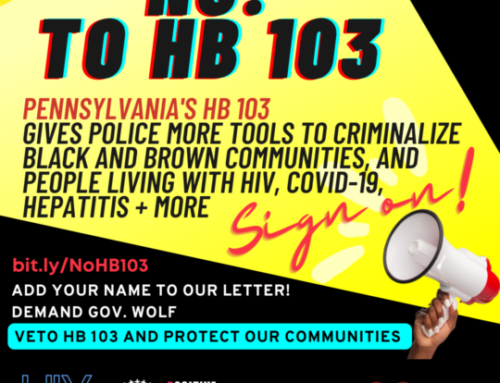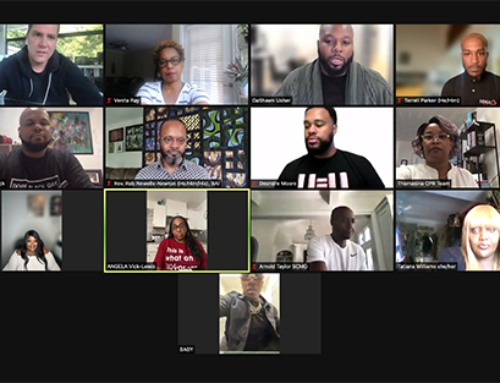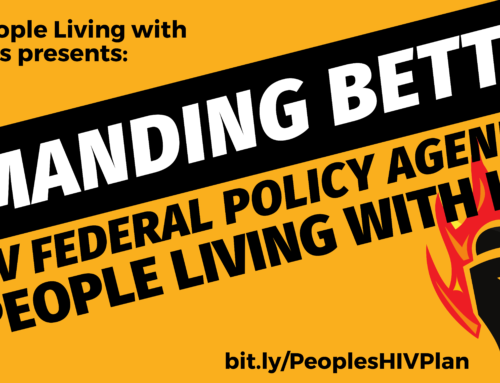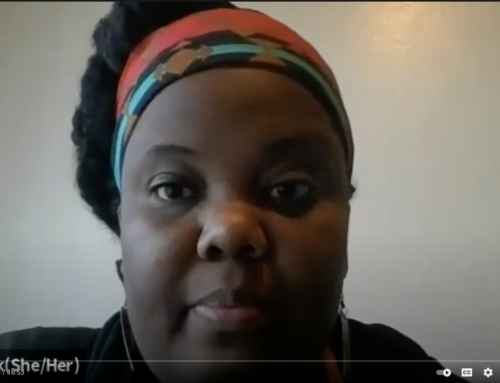 I have been privileged to be able to represent the Positive Women’s Network-USA on a national committee charged with creating a training curriculum to teach practitioners in the field about the intersection between Intimate Partner Violence (IPV) and HIV/AIDS.
The committee and project were convened by the National Network to End Domestic Violence (NNEDV) with a grant through the MAC AIDS fund. While this training does not include all violence against women, it is specifically targeting Intimate Partner Violence. It has been a very exciting process of meetings and curriculum revision. We have hashed out terminology, which at times conflicts between the two fields of Intimate Partner Violence and HIV, and other times, is very similar.
We address the fact that stigma plays a large role in women’s lives in both realms. We have incorporated culturally conscious language throughout the training, and have included a section on promising practices, so that practitioners can build the bridge between the two fields with the connections they make at these trainings. The trainings target practitioners including medical staff, case managers, social workers, and mental health professionals to name a few.
It has long been known by people who work in the field of HIV or live with HIV that there is a strong link between violence and acquiring HIV. Due to the inability to negotiate safer sex options, poverty, competing demands such as housing and food, and other structural issues, violence exacerbates vulnerability to HIV. This has not been a prime focus of research, however, and the two fields have not worked closely together in a very long time.
This is an important intersection to become aware of, whether you are working with an HIV-positive client and assessing Intimate Partner Violence, or you are working with clients who are experiencing intimate partner violence and are discussing risk reduction and HIV prevention. For women who have experienced violence, there are further barriers that prevent women from being able to access HIV testing services and HIV medical care/support services. Safety and psychosocial needs may be a higher priority than getting tested or staying in medical care. These are the kinds of topics this training will address, and hopefully begin the conversation about other important intersections that exist.
The committee will pilot trainings in April in three different U.S. cities. From these pilots, we will revise the curriculum as needed, and then, hopefully, the curriculum will be released for others to use and adapt! The date for the curriculum release is not set yet, but I foresee a very successful and exciting training being available, and I am excited that PWN has been able to be a part of its inception!
I have been privileged to be able to represent the Positive Women’s Network-USA on a national committee charged with creating a training curriculum to teach practitioners in the field about the intersection between Intimate Partner Violence (IPV) and HIV/AIDS.
The committee and project were convened by the National Network to End Domestic Violence (NNEDV) with a grant through the MAC AIDS fund. While this training does not include all violence against women, it is specifically targeting Intimate Partner Violence. It has been a very exciting process of meetings and curriculum revision. We have hashed out terminology, which at times conflicts between the two fields of Intimate Partner Violence and HIV, and other times, is very similar.
We address the fact that stigma plays a large role in women’s lives in both realms. We have incorporated culturally conscious language throughout the training, and have included a section on promising practices, so that practitioners can build the bridge between the two fields with the connections they make at these trainings. The trainings target practitioners including medical staff, case managers, social workers, and mental health professionals to name a few.
It has long been known by people who work in the field of HIV or live with HIV that there is a strong link between violence and acquiring HIV. Due to the inability to negotiate safer sex options, poverty, competing demands such as housing and food, and other structural issues, violence exacerbates vulnerability to HIV. This has not been a prime focus of research, however, and the two fields have not worked closely together in a very long time.
This is an important intersection to become aware of, whether you are working with an HIV-positive client and assessing Intimate Partner Violence, or you are working with clients who are experiencing intimate partner violence and are discussing risk reduction and HIV prevention. For women who have experienced violence, there are further barriers that prevent women from being able to access HIV testing services and HIV medical care/support services. Safety and psychosocial needs may be a higher priority than getting tested or staying in medical care. These are the kinds of topics this training will address, and hopefully begin the conversation about other important intersections that exist.
The committee will pilot trainings in April in three different U.S. cities. From these pilots, we will revise the curriculum as needed, and then, hopefully, the curriculum will be released for others to use and adapt! The date for the curriculum release is not set yet, but I foresee a very successful and exciting training being available, and I am excited that PWN has been able to be a part of its inception!
By Kat Griffith  I have been privileged to be able to represent the Positive Women’s Network-USA on a national committee charged with creating a training curriculum to teach practitioners in the field about the intersection between Intimate Partner Violence (IPV) and HIV/AIDS.
The committee and project were convened by the National Network to End Domestic Violence (NNEDV) with a grant through the MAC AIDS fund. While this training does not include all violence against women, it is specifically targeting Intimate Partner Violence. It has been a very exciting process of meetings and curriculum revision. We have hashed out terminology, which at times conflicts between the two fields of Intimate Partner Violence and HIV, and other times, is very similar.
We address the fact that stigma plays a large role in women’s lives in both realms. We have incorporated culturally conscious language throughout the training, and have included a section on promising practices, so that practitioners can build the bridge between the two fields with the connections they make at these trainings. The trainings target practitioners including medical staff, case managers, social workers, and mental health professionals to name a few.
It has long been known by people who work in the field of HIV or live with HIV that there is a strong link between violence and acquiring HIV. Due to the inability to negotiate safer sex options, poverty, competing demands such as housing and food, and other structural issues, violence exacerbates vulnerability to HIV. This has not been a prime focus of research, however, and the two fields have not worked closely together in a very long time.
This is an important intersection to become aware of, whether you are working with an HIV-positive client and assessing Intimate Partner Violence, or you are working with clients who are experiencing intimate partner violence and are discussing risk reduction and HIV prevention. For women who have experienced violence, there are further barriers that prevent women from being able to access HIV testing services and HIV medical care/support services. Safety and psychosocial needs may be a higher priority than getting tested or staying in medical care. These are the kinds of topics this training will address, and hopefully begin the conversation about other important intersections that exist.
The committee will pilot trainings in April in three different U.S. cities. From these pilots, we will revise the curriculum as needed, and then, hopefully, the curriculum will be released for others to use and adapt! The date for the curriculum release is not set yet, but I foresee a very successful and exciting training being available, and I am excited that PWN has been able to be a part of its inception!
I have been privileged to be able to represent the Positive Women’s Network-USA on a national committee charged with creating a training curriculum to teach practitioners in the field about the intersection between Intimate Partner Violence (IPV) and HIV/AIDS.
The committee and project were convened by the National Network to End Domestic Violence (NNEDV) with a grant through the MAC AIDS fund. While this training does not include all violence against women, it is specifically targeting Intimate Partner Violence. It has been a very exciting process of meetings and curriculum revision. We have hashed out terminology, which at times conflicts between the two fields of Intimate Partner Violence and HIV, and other times, is very similar.
We address the fact that stigma plays a large role in women’s lives in both realms. We have incorporated culturally conscious language throughout the training, and have included a section on promising practices, so that practitioners can build the bridge between the two fields with the connections they make at these trainings. The trainings target practitioners including medical staff, case managers, social workers, and mental health professionals to name a few.
It has long been known by people who work in the field of HIV or live with HIV that there is a strong link between violence and acquiring HIV. Due to the inability to negotiate safer sex options, poverty, competing demands such as housing and food, and other structural issues, violence exacerbates vulnerability to HIV. This has not been a prime focus of research, however, and the two fields have not worked closely together in a very long time.
This is an important intersection to become aware of, whether you are working with an HIV-positive client and assessing Intimate Partner Violence, or you are working with clients who are experiencing intimate partner violence and are discussing risk reduction and HIV prevention. For women who have experienced violence, there are further barriers that prevent women from being able to access HIV testing services and HIV medical care/support services. Safety and psychosocial needs may be a higher priority than getting tested or staying in medical care. These are the kinds of topics this training will address, and hopefully begin the conversation about other important intersections that exist.
The committee will pilot trainings in April in three different U.S. cities. From these pilots, we will revise the curriculum as needed, and then, hopefully, the curriculum will be released for others to use and adapt! The date for the curriculum release is not set yet, but I foresee a very successful and exciting training being available, and I am excited that PWN has been able to be a part of its inception!
 I have been privileged to be able to represent the Positive Women’s Network-USA on a national committee charged with creating a training curriculum to teach practitioners in the field about the intersection between Intimate Partner Violence (IPV) and HIV/AIDS.
The committee and project were convened by the National Network to End Domestic Violence (NNEDV) with a grant through the MAC AIDS fund. While this training does not include all violence against women, it is specifically targeting Intimate Partner Violence. It has been a very exciting process of meetings and curriculum revision. We have hashed out terminology, which at times conflicts between the two fields of Intimate Partner Violence and HIV, and other times, is very similar.
We address the fact that stigma plays a large role in women’s lives in both realms. We have incorporated culturally conscious language throughout the training, and have included a section on promising practices, so that practitioners can build the bridge between the two fields with the connections they make at these trainings. The trainings target practitioners including medical staff, case managers, social workers, and mental health professionals to name a few.
It has long been known by people who work in the field of HIV or live with HIV that there is a strong link between violence and acquiring HIV. Due to the inability to negotiate safer sex options, poverty, competing demands such as housing and food, and other structural issues, violence exacerbates vulnerability to HIV. This has not been a prime focus of research, however, and the two fields have not worked closely together in a very long time.
This is an important intersection to become aware of, whether you are working with an HIV-positive client and assessing Intimate Partner Violence, or you are working with clients who are experiencing intimate partner violence and are discussing risk reduction and HIV prevention. For women who have experienced violence, there are further barriers that prevent women from being able to access HIV testing services and HIV medical care/support services. Safety and psychosocial needs may be a higher priority than getting tested or staying in medical care. These are the kinds of topics this training will address, and hopefully begin the conversation about other important intersections that exist.
The committee will pilot trainings in April in three different U.S. cities. From these pilots, we will revise the curriculum as needed, and then, hopefully, the curriculum will be released for others to use and adapt! The date for the curriculum release is not set yet, but I foresee a very successful and exciting training being available, and I am excited that PWN has been able to be a part of its inception!
I have been privileged to be able to represent the Positive Women’s Network-USA on a national committee charged with creating a training curriculum to teach practitioners in the field about the intersection between Intimate Partner Violence (IPV) and HIV/AIDS.
The committee and project were convened by the National Network to End Domestic Violence (NNEDV) with a grant through the MAC AIDS fund. While this training does not include all violence against women, it is specifically targeting Intimate Partner Violence. It has been a very exciting process of meetings and curriculum revision. We have hashed out terminology, which at times conflicts between the two fields of Intimate Partner Violence and HIV, and other times, is very similar.
We address the fact that stigma plays a large role in women’s lives in both realms. We have incorporated culturally conscious language throughout the training, and have included a section on promising practices, so that practitioners can build the bridge between the two fields with the connections they make at these trainings. The trainings target practitioners including medical staff, case managers, social workers, and mental health professionals to name a few.
It has long been known by people who work in the field of HIV or live with HIV that there is a strong link between violence and acquiring HIV. Due to the inability to negotiate safer sex options, poverty, competing demands such as housing and food, and other structural issues, violence exacerbates vulnerability to HIV. This has not been a prime focus of research, however, and the two fields have not worked closely together in a very long time.
This is an important intersection to become aware of, whether you are working with an HIV-positive client and assessing Intimate Partner Violence, or you are working with clients who are experiencing intimate partner violence and are discussing risk reduction and HIV prevention. For women who have experienced violence, there are further barriers that prevent women from being able to access HIV testing services and HIV medical care/support services. Safety and psychosocial needs may be a higher priority than getting tested or staying in medical care. These are the kinds of topics this training will address, and hopefully begin the conversation about other important intersections that exist.
The committee will pilot trainings in April in three different U.S. cities. From these pilots, we will revise the curriculum as needed, and then, hopefully, the curriculum will be released for others to use and adapt! The date for the curriculum release is not set yet, but I foresee a very successful and exciting training being available, and I am excited that PWN has been able to be a part of its inception! 






